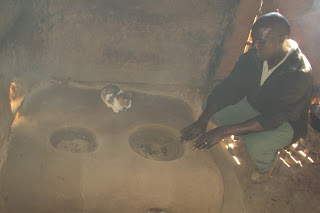 |
| Mr. Kamau inspecting a newly completed jiko |
Mr. Kamua who works with an NGO called Tree Is life Trust (TILT) involve communities through transfer of technologies, knowledge and skills on sustainable agriculture and climate change.
A part from being among the pioneer founders of the Ng’arua Maarifa center, he is also a frequent user of information resources available at the hub.
A part from being among the pioneer founders of the Ng’arua Maarifa center, he is also a frequent user of information resources available at the hub.
I paid a visit to his office and he narrated his experiences at the Maarifa centre since inception. From his feedback I established that besides benefiting as an individual, the communities he serves too have benefited from the knowledge he has acquired from the centre.
Networking.
The free internet service available at the centre gave him a platform to network with friends. He has subscribed to the social networks especially facebook thus enabling him to get in touch with his friends. He gets updates on new events through the site and widely receives and shares the same through the modern platform.
He frequently searches the internet where he receives mails and especially on the new resource mobilization strategies and opportunities. ‘‘I have been able to attended many workshops, and especially after getting connections through the net. This would have been difficult were it not for the availability of internet in this remote locality,’’ said Kamau.
Innovations
From his research, Kamau came across information on how to construct a Jiko, designed to serve both for cooking and as a chicken brooder. The heat from the Jiko provides warmth for young chicks, in a brooder underneath. He has tested the technology and many farmers have adopted and are successfully using it. ‘‘The energy saving jiko with a brooder have reached over 500 people within Ng’arua region and over 100 of them have been made’’ said Kamau.
Information hub
From ‘’appropriate technology’’ magazines, he has learned how to make a mud tank, for harvesting the rain water from the roof. The technology has also spread far and wide with many low income earners in the society opting for the simple and cheap way of harvesting water. He has trained twenty groups on how to make the mud tank. Two primary schools have adopted the technology which is now benefiting more than five hundred pupils.
The success of these technologies earned the confidence of user’s on information sourced from the Maarifa centre. ‘‘The centre has therefore become a point of reference where I refer people to get more information on various subjects that I cover in my work,’’ said Kamau.
Publicity.
Last year, Kamau wrote an article which was published in the ALIN’s flagship journal, the Baobab. ‘‘That story has opened up my world,’’ he said, referring to the huge publicity he and his organization got from the story. The feature story was about a method of locating underground water using two copper wires held parallel to each other and horizontal to the body frame, a method referred to as water dowsing. ‘’since the story was published I have received calls from as far as Tanzania and Uganda.’’ readers are seeking for more instructions on how to use that method. ‘’I have travelled to Murang’a twice and once in Athi river to show people how the technology works. ‘‘I am happy that all of the technologies were very successful,’’ he said.
The other skill he tried out from the information gathered from or through the Maarifa centre was making of a tubular biogas. ‘‘recently travelled to Kajiado, way past Nairobi, in a remote village of Nguruman to install a tubular biogas,’’ said kamau. The exposure, as he said gave him recognition from the communities and as such boosted his self esteem. It has also provided an alternative source of clean energy for the beneficiary households.
Skill gained
Kamau also operates a small business and has been sourcing information on how to run the business successfully. ‘‘The knowledge gained from the books has enabled me to improve on the management of my business.
Convenience in sending reports.
‘‘Communication with the head office of our organization has never been a problem, I send reports and receive official information through the internet at the Maarifa centre’’ said Kamau.
By Bett Kipsa’ng








